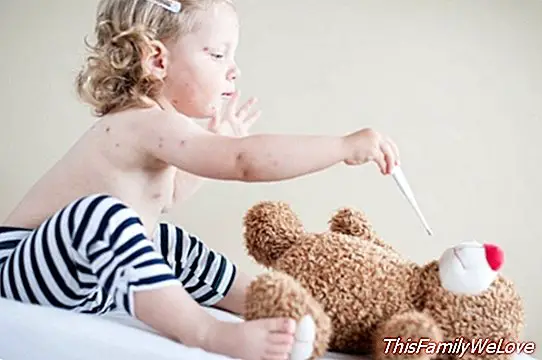Complications of measles, symptoms and vaccine

The measles is a disease caused by a very contagious virus and that is transmitted by respiratory route, through the secretions of the nose or mouth, when coughing or even when speaking sneeze. We tell you everything you should keep in mind about what it is, what are the symptoms of this disease in children and the importance of your vaccine.
How is measles
The doctors of the Spanish Association of Pediatrics of Primary Attention (Aepap) explain that the measles start as if it were a catarrh and with high fever the two first days. Children who have measles have mucus, malaise, little desire to eat, very red eyes and, sometimes, conjunctivitis. This moment (the beginning of the virus) is when the danger of contagion is greater.
However, the 'exclusive' sign of measles is another: the calls "Koplik spots", white spots that come out on the inside of the cheeks about two days before there is a Rash on the skin, which in turn leads to the onset of fever and a greater impact on the general condition.
The rash begins on the face and it is extended to the rest of the body, also to the palms of the hands and the soles of the feet. It does not usually itch at the beginning and in general it is red, leaving areas of healthy skin. After about five days, the rash disappears in the same order in which it appeared.
It is estimated that the complete recovery of measles occurs after 9-10 days, with cough and bronchitis being the last to disappear. Also, it's good to know that Once the measles has passed, you can not suffer again: the one that has had it becomes immune for this virus for life.
Complications of measles
Measles can be complicated in cases of children who are not vaccinated or who already have other health problems. Thus, there have been cases in which measles has resulted in otitis, pneumonia or diarrhea, for example.
It is true that in one of every 1,000 cases there may be a "very serious" involvement of the brain: acute encephalitis. According to the pediatricians of the Aepap, this appears between one and eight days after the rash, causes alterations in consciousness and seizures and can lead to death, although only in 15 percent of cases.
How is measles treated?
As we have explained, measles is not a disease as such, but a virus. Thus it is not necessary to use antibiotics, and in its place the most advisable thing is to isolate the child at home so that it does not spread the virus. If your son has measles, do not take it to the nursery or school until at least five days have passed since the appearance of the spots.
Use antipyretics for fever, wash your eyes often and give fluids so you do not get dehydrated. In case a specific treatment is necessary, it will be the doctor who determines it.
The measles vaccine
The measles vaccine it is considered 'systematic' in Spain; that is, of those must be administered to all children (in this case, from the year of age) and appears in the immunization schedule as official. Likewise, all adults who have not been vaccinated before or who have been seen (in a blood test) who do not have antibodies against the virus are advised to be vaccinated. There are certain exceptions (such as pregnant women) that should not be vaccinated, you can check it at your health center.
The measles vaccine is very effective. The Aepap ensures that 95 percent of people who are vaccinated against this virus once they are protected, and that the percentage is 99 percent in the case of those who are vaccinated twice.
In addition, most children have no side effects after the injection and, when there are, in general it is pain, inflammation or redness that disappears in a couple of days, so there is no need to worry. In some cases febrile symptoms have been detected, but they have also disappeared within a few days.
Angela R. Bonachera




